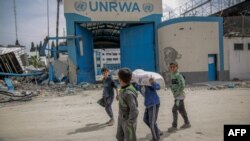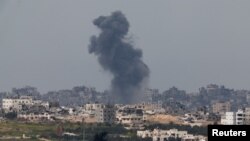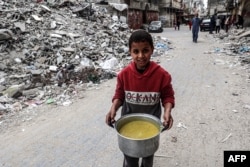Stalled talks aimed at securing a cease-fire in the Israel-Hamas war are expected to resume in earnest in Qatar as soon as Sunday, according to Egyptian officials.
The talks would mark the first time both Israeli officials and Hamas leaders join the indirect negotiations since the start of Ramadan. International mediators had hoped to secure a six-week truce before the Muslim holy month started earlier this week, but Hamas refused any deal that wouldn't lead to a permanent cease-fire in Gaza, a demand Israel rejected.
But both sides have made moves in recent days aimed at getting the talks, which never fully broke off, back on track.
Hamas gave mediators a new proposal for a three-stage plan that would end the fighting, according to two Egyptian officials. The officials spoke on condition of anonymity because they weren't authorized to reveal the contents of the sensitive discussions.
The first stage would be a six-week cease-fire that would see the release of 35 hostages — women, those who are ill and older people — held by militants in Gaza in exchange for 350 Palestinian prisoners held by Israel.
Hamas would also release at least five female soldiers in exchange for 50 prisoners, including some serving long sentences on terror charges, for each soldier. Israeli forces would withdraw from two main roads in Gaza, let displaced Palestinians return to northern Gaza, which has been devastated by the fighting, and allow the free flow of aid to the area, the officials said.
Nearly one-third of the children younger than 2 in the isolated north have acute malnutrition, the United Nations children's agency said Friday.
In the second phase, the two sides would declare a permanent cease-fire and Hamas would free the remaining Israeli soldiers held hostage in exchange for more prisoners, the officials said.
In the third phase, Hamas would hand over the bodies it is holding in exchange for Israel lifting the blockade of Gaza and allowing reconstruction to start, the officials said.
Talks were expected to resume Sunday afternoon, though they could get pushed to Monday, the Egyptian officials said.
Israeli Prime Minister Benjamin Netanyahu called the proposal "unrealistic" but agreed to send Israeli negotiators to Qatar. His government has rejected calls for a permanent cease-fire, insisting it must first fulfill its stated goal of "annihilating Hamas."
Israeli protests
Thousands of people demonstrated Saturday night in Tel Aviv to show their impatience with Netanyahu's government and demand a deal to free the hostages. Some expressed support for U.S. Senate Majority Leader Chuck Schumer's sharp criticism of Netanyahu's handling of the war and his call for a new election.
"I think that we are in a situation where they are completely right, that we have a war that is continuing well beyond what is necessary," protester Yehuda Halper said.
Netanyahu's office said Friday he approved military plans to attack Rafah, the southernmost town in Gaza where about 1.4 million displaced Palestinians — more than half the enclave's population — are sheltering. Israel wants to target Hamas battalions stationed there.
Many fled to Rafah when Israel attacked Gaza following the October 7 Hamas attack on southern Israel that killed 1,200 people and took 250 hostage; about 100 of the hostages have been freed.
The United States and other countries have warned that a military operation in Rafah could be disastrous.
Netanyahu OKs Rafah invasion
Netanyahu's office didn't give details or a timetable for the Rafah operation but said that it would involve the evacuation of the civilian population. The military has said it planned to direct civilians to "humanitarian islands" in central Gaza.
"Many people are too fragile, hungry and sick to be moved again," World Health Organization Director-General Tedros Adhanom Ghebreyesus said on social media, adding that there are no fully functional, safe health centers elsewhere in Gaza. "In the name of humanity, we appeal to Israel not to proceed."
The Gaza Health Ministry said at least 31,553 Palestinians have been killed in the war. The ministry doesn't differentiate between civilians and combatants in its count, but says women and children make up two-thirds of the dead.
An Israeli strike early Saturday flattened a house in the urban Nuseirat refugee camp in central Gaza, killing at least 19 people, including nine children, according to records at the al-Aqsa Martyrs hospital. An Associated Press journalist there saw the bodies.
Israel's offensive has driven most of Gaza's 2.3 million people from their homes. A quarter of Gaza's population is starving, according to the U.N.
Aid arrives by sea
As part of efforts to deliver desperately needed aid, a ship inaugurated a sea route from Cyprus on Friday and offloaded 200 tons of humanitarian supplies sent by the aid group World Central Kitchen destined for people in northern Gaza.
The group said it was preparing another vessel in Cyprus with hundreds of tons of aid.
Also on Saturday, Germany joined a group of countries, including the U.S. and Jordan, in conducting airdrops of aid over Gaza. The U.S. also has announced separate plans to construct a pier to get aid in.
Displaced Palestinians living in tents along the Mediterranean coast remained hungry and bleak.
"The situation is so bad that no one can imagine it, and the ship, even if it helps, will be a drop in the ocean," said Zahr Saqr in Muwasi. "We run like dogs behind air drops."






